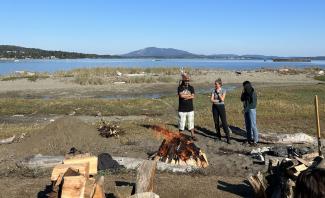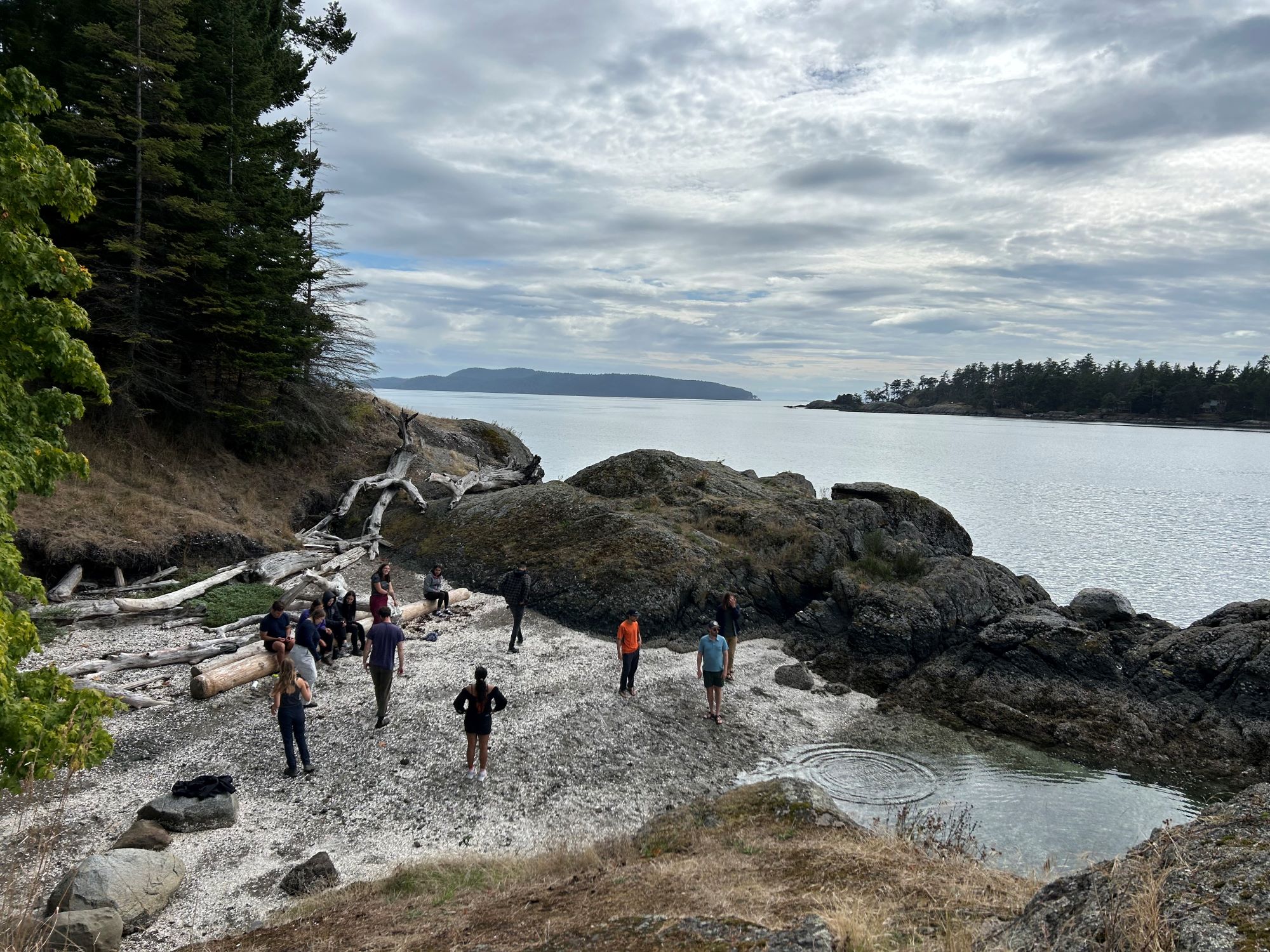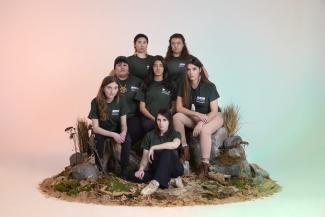
Dr. Judith Sayers, CM (LLB ’81), president of the Nuu-Chah-Nulth Tribal Council on Vancouver Island, sees a disconnect between what Indigenous communities need to know about projects taking place on their land and how to properly assess their impact. That’s because Indigenous communities often do not have the resources to fully assess the economic, environmental and cultural effects of, say, a forest-clearing project before the chainsaws begin whirring.
“It’s a huge job to assess these projects,” says Sayers, “and for so long the provincial government has come to Indigenous communities with idiotic consultations, and Indigenous territory leaders may not have the dollars or expertise to really look at them closely.”
That frustration led Sayers to become a senior advisor to the Balance Co-Lab: Collaboration for Sustainable Communities, a new initiative supported by several Allard Law professors that seeks to build out a replicable model for the assessment of projects taking place on Indigenous land in BC.
Community-based research is at the centre of this and other initiatives by Allard Law faculty who are forging deeper relationships with Indigenous leaders and with sustainability-focused community organizations. In community-based research, it’s the community members, rather than the researchers, who are setting the agenda. Community involvement throughout the research project is also key. Through these collaborations, these projects instigate knowledge gathering, empower communities and give students a holistic look at different kinds of legal structures they may not have encountered otherwise.
Cultivating community connections
Allard Law Professor Dr. Robert Clifford wants his students to recognize the many ways Indigenous law connects to the land they live on. “When we think about the state of the climate crisis and what continues to propel and entrench that vast harm, we need to realize that Western law doesn’t have all the answers, and we can look at Indigenous systems that engaged with the land and water for thousands of years,” says Clifford, who teaches the biennial course ĆELÁṈENEȽ: A Field Course in the Re-emergence of W̱SÁNEĆ Law.
A partnership between Allard Law and the University of Victoria Faculty of Law, the course gives Allard Law students the opportunity to experience immersive, land-based learning on W̱SÁNEĆ territory, on and around the Saanich Peninsula of Vancouver Island. Students spend days hiking through mountains and along rivers as they develop relationships with Indigenous community members to learn more about W̱SÁNEĆ legal structures and community projects they can help support.
Indigenous knowledge is shared in a number of different ways, says Clifford, who is a member of the W̱SÁNEĆ nation. “To begin, the first month of the course is spent on the land learning from elders and knowledge-holders about W̱SÁNEĆ law, culture and connections with place. In this way, students receive an intensive introduction to W̱SÁNEĆ knowledge from a variety of different voices and perspectives,” he says.
“Students seek to understand, advocate for, and uphold W̱SÁNEĆ perspectives in any way they can. In that way, they try to give voice to the W̱SÁNEĆ communities and advocate for their interests,” Clifford says. “And with laws predating Canadian law, these Indigenous communities have a lot to teach students.”
With immersive learning as a base, students are ready to dive into working on land-based projects. In one recent project, students collaborated with the W̱SÁNEĆ Leadership Council on their QENTOL, YEN W̱SÁNEĆ Marine Guardians Program, which aims to restore the relationship between the orcas and the W̱SÁNEĆ people and to help orcas thrive. Students monitored rivers, such as Goldstream, and throughout the project developed a stronger understanding of the importance of protecting orcas in the region.
That project inspired students to help grow and support the work of “a guardianship program that addresses the community’s interests and concerns to do more to protect the killer whales,” says Clifford.
“Each of those projects is identified in consultation with the W̱SÁNEĆ community and considered important and ongoing work,” Clifford notes. And each project is about putting W̱SÁNEĆ law into action and furthering W̱SÁNEĆ governance.

For Brianna Patrick, an Allard Law student from Roseau River First Nation in Manitoba, the biggest takeaway from the course is how intertwined Indigenous law is with everyday life – and how critical it is to understand the context behind Indigenous laws. She cites the example of learning about “how to treat salmon with respect in Indigenous territories due to the creation story of the salmon and how it was brought to the people there” – and that “there is a relationship between everything in Indigenous communities.”
Patrick adds that anyone coming from outside of those communities needs to do more than “just point to Indigenous laws written on documents. They need to know everything else about the context of why a certain law matters.”
ĆELÁṈENEȽ is meant to be reciprocal, Clifford says. “Students are engaged in land-based learning with elders and knowledge-holders to learn more about Indigenous laws and history, and W̱SÁNEĆ communities benefit by that learning being translated on the ground to assist with projects important to them,” he notes.
Patrick echoes Clifford, saying, “What I’m getting from the course is not something I can learn in the classroom. Going forward in my career I want to have a better understanding of what it means to engage with Indigenous communities and how their law is so different from what I know about Western law.”
Partnership addresses Indigenous community members' needs
ĆELÁṈENEȽ puts the W̱SÁNEĆ community in the driver’s seat – it focuses on projects that are critical to the community within the context of W̱SÁNEĆ laws and territory. The Co-Lab Project offers a different model of community-based research, but many of the aims are similar.
In this unique initiative, project leaders will work with six Indigenous communities, and they have engaged with two BC nations so far: the Toquaht and the T'Sou-ke Nations.
Johnny Mack, assistant professor at Allard Law, is one of the project co-applicants, and has a personal connection to the Balance Co-Lab’s mission. Hailing from the Toquaht Nation, Mack says he finds it fulfilling to be involved in a budding initiative that aims to “promote sustainability in that community and develop new forms of economic development that are more appropriate for First Nations needs – and offer them expertise and resources in order to help them preserve their culture and also find ways to those development goals.”
He adds: “The Toquaht, like many other First Nations, wanted to develop responsibly, in a way that prioritized local community wellbeing and is informed by Toquaht cultural values.”
Strengthened with $2.5 million in funding from the Social Sciences and Humanities Research Council Partnership Grant, the initiative will evaluate the potential influence of project proposals by looking at four areas of well-being: economic, environmental, cultural and community.
The first phase involves scoping out potential projects to assess which affect T’Sou-ke Nation communities. Each project will address issues that First Nations are often not very well equipped to undertake, says Mack. “Climate change is important to these communities, and so with monitoring environmental concerns, this collaboration will find ways to assist with issues that may require software, hardware and expertise available to universities,” he says.
Other Allard Law professors involved in the initiative as collaborators include Andrea Hilland, KC (LLB ‘02, LLM ‘13), who is a member of the Nuxalk Nation, Dr. Carol Liao (LLB ‘03, LLM ‘10, PhD ‘16), Dr. Graham Reynolds and Dr. Stepan Wood. Mack notes that Allard Law students will also be folded into several approaches to working with Indigenous communities interested in building long-term sustainable solutions.
Similar to Clifford’s ĆELÁṈENEȽ, Mack says the Balance Co-Lab will give students a rare glimpse into the nuances of Indigenous law while assisting First Nations “with advancing their own goals,” adding that “the Co-Lab gives students the opportunity they might not often have in thinking about legal traditions and learning from the communities themselves – beyond firm or court work.”
Mack says the project is international in its foundation. Civil engineer and environmentalist Kēpa Morgan, who has long blended environmental innovations with modern science and Indigenous knowledge, has applied the sustainability assessment systems model with Māori partners in New Zealand to figure out the best approach to environmental remediation after the largest maritime disaster in the country’s history, the wreck of the MV Rena in 2011. The Toquaht Nation has also used the system to analyze the impact of all of its own economic development efforts since 2018.
Sayers, who is also an adjunct professor with the Gustavson School of Business and the School of Environmental Studies at UVic, is optimistic that the Co-Lab’s assessment tools will have a far-reaching impact thanks to on-the-ground collaborations between professors, students and Indigenous community members
“When we have someone like Johnny involved, it gives everything more credibility since he has roots in the land and in the community he is serving,” Sayers says. “Learning more about a proposed project’s effect on, say, revenue and jobs will give us a framework that we can bring to other proposals down the road, and the beauty of it all is that First Nations communities can decide what’s important to them.”
A precedent in climate change litigation
Empowering community groups to fight climate change and holding corporations accountable are key motivations for Allard Law Professor Dr. Hassan Ahmad.
Ahmad is passionate about combatting the “harm that corporations put forth into the world that affects all of us" through his research and advocacy work. An expert on climate change litigation in Canada, he represented Citizens for Public Justice, a grassroots environmental justice NGO, at the Ontario Court of Appeal in the hearing in Mathur v. Ontario in January 2024.
The case was first before the courts in November 2019, when a group of seven youths sued Ontario Premier Doug Ford’s government for replacing the province’s previous greenhouse gas emissions reduction target with a weaker objective. Mathur made history in 2023 when a judge ruled – for the first time in Canada – that courts can consider whether a government’s response to climate change policies infringes upon human rights.

In a court presided over by Justice Marie-Andrée Vermette, Ontario argued that the Province’s contributions to global emissions were relatively low.
Vermette slapped down this argument and noted that climate change is a global problem that requires collective action. Still, the court held that Ontario’s watered-down climate target failed to violate the right to life, security of the person or equality under Sections 7 and 15 of the Charter.
The recent appeal sought to reverse that decision, with Ahmad representing Citizens for Public Justice, one of a dozen interveners involved in the case. The court has yet to issue its ruling.
Ahmad says he was impressed with the Mathur appellants’ creative arguments. “They want a return to what the government was previously doing,” he says. “Typically, Charter arguments don’t involve the court forcing the government to do something, to pass legislation. We elect politicians and leave them to enact laws.”
At the hearing, Ahmad argued that Section 7 of the Charter – that everyone has the right to life, liberty and security of the person – should include an appreciation of the public trust doctrine, which holds that certain natural resources are so vital that the government is obligated to protect and preserve them for public use, now and in the future.
Ahmad draws a link between this case and what he can bring to the classroom in his Torts course, among others: “Mathur teaches students about the judiciary’s limits in adjudicating what would largely be seen as policy issues that affect a broad swath of society. Traditionally, courts would be reticent to hear such cases. Climate change litigation, like Mathur, is again testing those boundaries.”
Maryo Wahba, climate justice policy analyst and communications coordinator at Citizens for Public Justice, says Ahmad’s involvement lends legitimacy and power to his organization’s efforts to give a voice to the community of Canadians concerned about climate change. “We are really appreciative of using a legal strategy as a way for advocating for the climate,” he adds, “and the legal expertise Hassan [Ahmad] brings to our intervention is invaluable.”
The article was originally published in the 2024 issue of the Peter A. Allard School of Law's alumni magazine.


